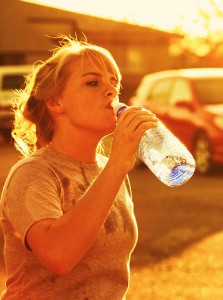 For the first time, a study proved that using polycarbonate plastic increases your blood levels of bisphenol-A. And not just a little bit, either. After a week of using these materials for beverages, study participants had a 60 percent increase in the level of BPA in their blood.
For the first time, a study proved that using polycarbonate plastic increases your blood levels of bisphenol-A. And not just a little bit, either. After a week of using these materials for beverages, study participants had a 60 percent increase in the level of BPA in their blood.
Bisphenol-A has been linked to early onset of puberty, low sperm count and infertility, and its carcinogenic effects may include breast cancer. It has also been linked to heart disease and diabetes. You’ve heard all of this, I’m sure.
But how ’bout this? Bisphenol-A was first developed as a synthetic hormone. It’s an endocrine disruptor. It affects our children. It affects our adults. And the FDA still refuses to require removal from food contact materials?!
Fine. *Sigh* We as parents and consumers will take care of this. By demanding BPA-free items, we are making changes where the FDA is so clearly powerless to do so. Manufacturers are listening to us. Various cities, counties, and even states and countries are banning the chemical.
And this study only confirms our fears. Not only did the Harvard School of Public Health researchers find that frightening increase; that was when drinking cold liquids. But how many babies are fed warm breastmilk or formula from a polycarbonate bottle? Yeesh! Study author Karin B. Michels said,
We found that drinking cold liquids from polycarbonate bottles for just one week increased urinary BPA levels by more than two-thirds.
If you heat those bottles, as is the case with baby bottles, we would expect the levels to be considerably higher.
This would be of concern since infants may be particularly susceptible to BPA’s endocrine-disrupting potential.
It’s great that someone is fretting over the tots and the endocrine-disrupting chemical. Until the FDA starts paying attention to the wealth of studies on bisphenol-A, let’s continue to use our buying power to get this creepy chemical outta our kids’ gear.
Image: Pink Sherbet Photography on Flickr under a Creative Commons License.
[…] water poses a threat due to possible perchlorate contamination and BPA leaching from the plastic, but it seems reasonable to assume that in the United States, bottled water is free from fecal […]